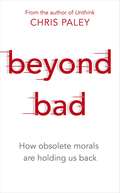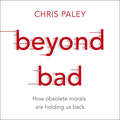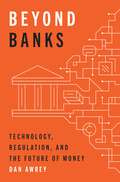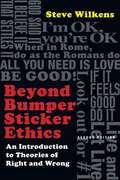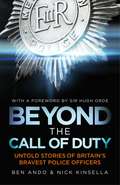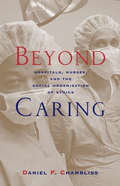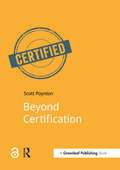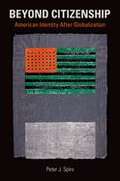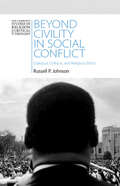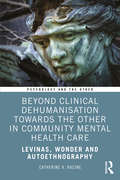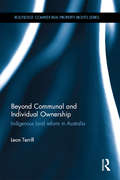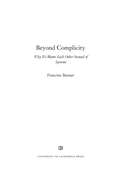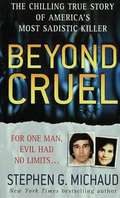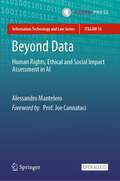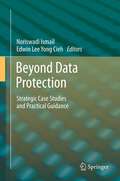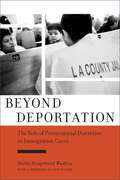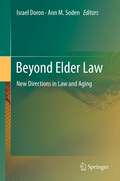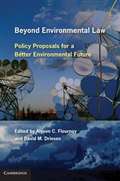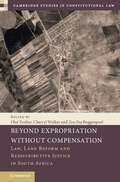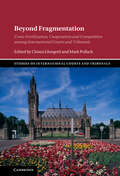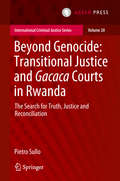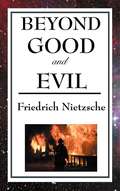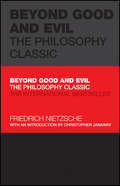- Table View
- List View
Beyond Bad: How obsolete morals are holding us back
by Chris Paley'Truly thought-provoking. Paley puts forth an astonishingly original hypothesis and defends it eloquently, marshalling cutting-edge science to argue against the very idea of morality.'Kurt Gray, Associate Professor, University of North Carolina, Chapel Hill'There is a serious challenge here to received ways of thinking for the lay public and professional moral philosophers alike.' John P Burgess, John N Woodhull Professor of Philosophy, Princeton UniversityMorals have held empires together, kept soldiers marching under fire, fed the hungry, passed laws, built walls, welcomed immigrants, destroyed careers and governed our sex lives. But what if morality's all meaningless rubbish, a malfunctioning relic of our evolutionary past? This is the provocative argument that Chris makes. This isn't an attack on one set of moral codes or one way of thinking about ethics: it's a call for abolishing the whole caboodle.He uses evolutionary psychology to show how and why morality emerged: theyenabled our forebears to survive and prosper in tribal groups. Today, our morals constrain us, bias us, and push us in the wrong direction. The biggest challenges our species faces, whether global warming, nuclear proliferation or the rise of the robots, are pan-human. These challenges are beyond what our moral minds were designed to cope with. You can't build smartphones with stone-age axes, and you can't solve modern humanity's problems with tools that are designed to create primitive, competitive groups.From Chris Paley, author of the 'extraordinary', 'startling' and 'thought-provoking' Unthink, comes Beyond Bad, which shows morals hinder us from achieving what we want to achieve. Beyond Bad is the book that 'does for morals what Dawkins did for God'.
Beyond Bad: How obsolete morals are holding us back
by Chris Paley'Brilliantly unillusioned thinking... It could hardly be more necessary in these all-too-moralistic times' - James Marriott, THE TIMES'There is a serious challenge here to received ways of thinking for the lay public and professional moral philosophers alike.' John P Burgess, John N Woodhull Professor of Philosophy, Princeton UniversityScientific research has achieved what thousands of years of philosophising failed to do: explain why we have morals and how they work. The answers are surprising and frequently disturbing.Morals have held empires together, kept soldiers marching under fire, fed the hungry, passed laws, built walls, welcomed immigrants, destroyed careers and governed our sex lives. But what if morality's all meaningless rubbish, a malfunctioning relic of our evolutionary past?This is the provocative argument that Chris makes. This isn't an attack on one set of moral codes or one way of thinking about ethics: it's a call for abolishing the whole caboodle.He uses evolutionary psychology to show how and why morality emerged: they enabled our forebears to survive and prosper in tribal groups. Today, our morals constrain us, bias us, and push us in the wrong direction.The biggest challenges our species faces, whether global warming, nuclear proliferation or the rise of the robots, are pan-human. These challenges are beyond what our moral minds were designed to cope with. You can't build smartphones with stone-age axes, and you can't solve modern humanity's problems with tools that are designed to create primitive, competitive groups.From Chris Paley, author of the 'extraordinary', 'startling' and 'thought-provoking' Unthink, comes Beyond Bad, which shows morals hinder us from achieving what we want to achieve. Beyond Bad is the book that 'does for morals what Dawkins did for God'. (P) 2021 Hodder & Stoughton Ltd
Beyond Banks: Technology, Regulation, and the Future of Money
by Dan AwreyHow new technology is rapidly changing the nature of money and the way we payA diverse and growing range of financial institutions and platforms—from PayPal and Venmo to WeChat, Alipay, and the brave new world of stablecoins—has harnessed new technology to disrupt the system of money and payments as we know it. Beyond Banks explains why this disruption holds out the promise of faster, cheaper, more convenient, and more secure payments, but also how it increasingly risks exposing consumers, businesses, and governments to the problem of bad money.Dan Awrey traces the origins of our current bundled system of banking, money, and payments. He explains why the problem of bad money—the result of antiquated and inadequate laws and regulation that fail to establish credible commitments to hold, transfer, or return a customer&’s money on demand—requires that policymakers fundamentally rethink their approach toward the design of the laws and institutions at the heart of this system. He presents ways to effectively unbundle banking from money and payments, ensure the credibility of monetary commitments, and promote the stability of this system. Awrey also envisions a more forward-looking role for policymakers in encouraging greater technological experimentation, competition, and innovation in the realm of payments.Beyond Banks sheds critical light on the important but too often dysfunctional relationship among technology, regulation, and money, and lays the foundations for a safer, more nimble, and more inclusive system of money and payments.
Beyond Bumper Sticker Ethics: An Introduction to Theories of Right and Wrong
by Steve WilkensIdeas have consequences. And sometimes those ideas can be squeezed into slogans, slapped on bumper stickers and tweeted into cyberspace. These compact messages coming at us from all directions often compress in a few words entire ethical systems. It turns out that there's a lot more to the ideas behind these slogans--ideas that need to be sorted out before we make important moral decisions as individuals or as societies. In this revised and expanded edition of Steve Wilkens's widely-used text, the author has updated his introductions to basic ethical systems:cultural relativismethical egoismutilitarianismbehaviorismsituation ethicsKantian ethicsvirtue ethicsnatural law ethicsdivine command theoryHe has also added two new chapters:evolutionary ethicsnarrative ethicsWith clarity and wit Wilkens unpacks the complicated ideas behind the slogans and offers Christian evaluations of each.
Beyond The Call Of Duty: Untold Stories of Britain's Bravest Police Officers
by Ben Ando Nick KinsellaThe book used by Thandie Newton to research her part in Line of Duty. A lone policewoman disarms a knife-wielding schizophrenic; two officers drag a woman from a railway line seconds before an express train roars past; an undercover cop clings onto the bonnet of a drug-dealer's car as it speeds through a busy town centre. These are just some of the ways Britain's police officers are daily called upon to demonstrate bravery in the line of duty when even the most routine call can turn into a life-or-death situation and split-second judgements can make all the difference. Sometimes officers make the ultimate sacrifice in fulfilling their duty. When PC Bill Parker was swept to his death by floodwaters in Cumbria in 2009, he had been working to save stranded motorists from the same fate.This thrilling collection of first-person accounts of true courage celebrates the sustained bravery and presence of mind routinely displayed by so many officers in England, Wales and Scotland. The stories also reveal an insider's view of the culture, training and techniques police officers use in carrying out their duties.
Beyond Caring: Hospitals, Nurses, and the Social Organization of Ethics (Morality And Society Ser.)
by Daniel F. ChamblissVividly documenting the real world of the contemporary hospital, its nurses, and their moral and ethical crises, Dan Chambliss offers a sobering revelation of the forces shaping moral decisions in our hospitals. Based on more than ten years' field research, Beyond Caring is filled with eyewitness accounts and personal stories demonstrating how nurses turn the awesome into the routine. It shows how patients, many weak and helpless, too often become objects of the bureaucratic machinery of the health care system and how ethics decisions, once the dilemmas of troubled individuals, become the setting for political turf battles between occupational interest groups. The result is a compelling combination of realism and a powerful theoretical argument about moral life in large organizations.
Beyond Certification (Doshorts Ser.)
by Scott PoyntonThis book is free to download in PDF and EPub formats. Is certification the solution? Can it deliver urgently needed improvements to complex problems like deforestation and the exploitation of people? In this controversial new book, Scott Poynton, founder of The Forest Trust, makes a compelling case for a new approach to social and environmental problems that goes "beyond certification".Certification emerged from the 1992 Rio Earth Summit amidst great hope. Since then, despite a proliferation of certification schemes in twenty-five industry sectors, the destructive and irresponsible exploitation of natural and human resources has grown still worse. Beyond Certification reviews the positive aspects of certification, of which there are many, but argues that we can no longer afford to gloss over its failures. The book offers an alternative model, VT-TV, based on Values, Transparency, Transformation and Verification, which the author has been exploring and implementing with over 70 companies and industries around the world. These companies are transforming the story of the raw materials they use – wood, palm oil, pulp and paper, stone, charcoal, soy, beef, sugar, dairy, rubber, coffee, cocoa and coconut. Mining companies are also exploring this approach, making decisions aligned with fundamental values and what they know to be right.The results? Trust is emerging as former combatants awake to the importance of working together. Guns have been removed from forests, land set aside for protection, worker rights and conditions improved and long-standing conflicts have been resolved as people confront their legacies. Beyond Certification does not claim that this VT-TV model is the only solution. Rather, it shows how new and seemingly radical thinking can catalyze positive change. Included: the limits of roundtable certification illustrated with real, practical examples; the intricacies of the change process – how companies move from destructive to more responsible practices; how to implement more holistic, economically effective, durable systems to better protect people and the environment.
Beyond Citizenship: American Identity After Globalization
by Peter J. SpiroAmerican identity has always been capacious as a concept but narrow in its application. Citizenship has mostly been about being here, either through birth or residence. The territorial premises for citizenship have worked to resolve the peculiar challenges of American identity. But globalization is detaching identity from location. What used to define American was rooted in American space. Now one can be anywhere and be an American, politically or culturally. <p><p> Against that backdrop, it becomes difficult to draw the boundaries of human community in a meaningful way. Longstanding notions of democratic citizenship are becoming obsolete, even as we cling to them. This book charts the trajectory of American citizenship and shows how American identity is unsustainable in the face of globalization. The author describes how citizenship law once reflected and shaped the American national character. He explores the histories of birthright citizenship, naturalization, dual citizenship, and how those legal regimes helped reinforce an otherwise fragile national identity. But on a shifting global landscape, citizenship status has become increasingly divorced from any sense of actual community on the ground. <p><p> As the bonds of citizenship dissipate, membership in the nation-state becomes less meaningful. The rights and obligations distinctive to citizenship are now trivial. Naturalization requirements have been relaxed, dual citizenship embraced, and territorial birthright citizenship entrenched―developments that are all irreversible. Loyalties, meanwhile, are moving to transnational communities defined in many different ways: by race, ethnicity, gender, religion, age, and sexual orientation. These communities, the author boldly argues, are replacing bonds that once connected people to the nation-state, with profound implications for the future of governance.
Beyond Civility in Social Conflict: Dialogue, Critique, and Religious Ethics (New Cambridge Studies in Religion and Critical Thought)
by Russell P. JohnsonHow can one speak and act in ways that overcome entrenched social conflicts? In polarized societies, some insist that the survival of democracy depends on people abiding by rules of civility and mutual respect. Others argue that the political situation is so dire that one's values need to be fought for by any means necessary. Across the political spectrum, people feel like they need to choose between the morality of dialogue and the effectiveness of protest. Beyond Civility in Social Conflict makes an important intervention in this debate. Taking insights from nonviolent direct action, it provides a model for advocacy that is both compassionate and critical. Successful communicators can help their opponents by dismantling the illusions and unjust systems that impede human flourishing and pit people against one another. The final chapter turns specifically to Christian ethics, and what it means to 'love your enemies' by disagreeing with them.
Beyond Clinical Dehumanisation towards the Other in Community Mental Health Care: Levinas, Wonder and Autoethnography (Psychology and the Other)
by Catherine A. RacineBeyond Clinical Dehumanisation Toward the Other in Community Mental Health Care offers a rare and intimate portrayal of the moral process of a mental health clinician that interrogates the intractable problem of systemic dehumanisation in community mental health care and looks to the notion of "wonder" and the visionary relational ethics of Emmanuel Levinas for a possible cure. An interdisciplinary study with transdisciplinary aspirations, this book contributes an original and compelling voice to the emerging therapeutic conversation attempting to re-imagine and transcend the objectifying constraints of the dominant discourse and the reductive world view that drives it. Chapters bring into dialogue the fields of community mental health care, psychology, psychology and the Other, the philosophy of wonder, Levinasian ethics, clinical ethics, the moral research of autoethnography and the medical humanities, to consider the defilement of the vulnerable help seeker, the moral injury of the clinician and look for answers beyond. This book is an ethical primer for mental health professionals, researchers, educators, advocates and service users working to re-imagine and heal a broken system by challenging the underpinnings of entrenched dehumanisation and standing with those they "serve".
Beyond Communal and Individual Ownership: Indigenous Land Reform in Australia (Routledge Complex Real Property Rights Series)
by Leon TerrillOver the last decade, Australian governments have introduced a series of land reforms in communities on Indigenous land. This book is the first in-depth study of these significant and far reaching reforms. It explains how the reforms came about, what they do and their consequences for Indigenous landowners and community residents. It also revisits the rationale for their introduction and discusses the significant gap between public debate about the reforms and their actual impact. Drawing on international research, the book describes how it is necessary to move beyond the concepts of communal and individual ownership in order to understand the true significance of the reforms. The book's fresh perspective on land reform and careful assessment of key land reform theories will be of interest to scholars of indigenous land rights, land law, indigenous studies and aboriginal culture not only in Australia but also in any other country with an interest in indigenous land rights.
Beyond Complicity: Why We Blame Each Other Instead of Systems
by Francine BannerAn ambitious study of our obsession with complicity that shows how we can all become "good accomplices." Beyond Complicity is a fascinating cultural diagnosis that identifies our obsession with complicity as a symptom of a deeply divided society. The questions surrounding what it means to be legally complicit are the same ones we may ask ourselves as we evaluate our own and others' responsibility for inherited and ongoing harms, such as racism, sexism, and climate change: What does it mean that someone "knew" they were contributing to wrongdoing? How much involvement must a person have in order to be complicit? At what point are we obligated to intervene? Francine Banner ties together pop culture, politics, law, and social movements to provide a framework for thinking about what we know intuitively: that our society is defined by crisis, risk, and the quest to root out hazards at all costs. Engaging with legal cases, historical examples, and contemporary case studies, Beyond Complicity unfolds the complex role that complicity plays in US law and society today, offering suggestions for how to shift focus away from blame and toward positive, lasting systemic change.
Beyond Cruel: The Chilling True Story Of America's Most Sadistic Killer
by Stephen G. MichaudMike DeBardeleben was known as the Mall Passer for the way he passed off fake money at local shopping centers. But when U.S. Secret Service agents finally arrested him, they were met with more than just phony bills. They found that their counterfeiter led a shocking double life... <p><p> DeBardeleben's home was littered with drugs, bondage gear, and a collection of audio tapes in which he recorded the abuse of his countless victims. As the evidence mounted, a terrifying profile emerged of a man who forced women to be his accomplices, practiced sadism, even dressed up in women's clothes—a serial killer whose depraved fantasies led to a spree of violence that would last as long as eighteen years...and would end in a sentence of almost 400 years in prison. As terrifying as it is true, this is the story of a man who proved to be, beyond the shadow of a doubt, BEYOND CRUEL.
Beyond Data: Human Rights, Ethical and Social Impact Assessment in AI (Information Technology and Law Series #36)
by Alessandro ManteleroThis open access book focuses on the impact of Artificial Intelligence (AI) on individuals and society from a legal perspective, providing a comprehensive risk-based methodological framework to address it. Building on the limitations of data protection in dealing with the challenges of AI, the author proposes an integrated approach to risk assessment that focuses on human rights and encompasses contextual social and ethical values. The core of the analysis concerns the assessment methodology and the role of experts in steering the design of AI products and services by business and public bodies in the direction of human rights and societal values. Taking into account the ongoing debate on AI regulation, the proposed assessment model also bridges the gap between risk-based provisions and their real-world implementation. The central focus of the book on human rights and societal values in AI and the proposed solutions will make it of interest to legal scholars, AI developers and providers, policy makers and regulators. Alessandro Mantelero is Associate Professor of Private Law and Law & Technology in the Department of Management and Production Engineering at the Politecnico di Torino in Turin, Italy.
Beyond Data Protection: Strategic Case Studies and Practical Guidance
by Edwin Lee Yong Cieh Noriswadi IsmailThe book deals with data protection issues from practical viewpoints. 40% of the content focus on the Malaysian Personal Data Protection Act (PDPA) 2010 progress, whilst 60% of the content focus on leading comparative practical guidance from Europe. Part of the PDPA provisions is mirrored from European approaches and practices. The approach of this book is straightforward, handy and readable and is supplemented by practical applications, illustrations, tables and diagrams. Practical examples highlighted in this book range from cloud computing, radio frequency identification technology, social media networks and information security to basic related aspects of data protection issues covering strategic leadership, management, governance and audit in businesses, organisations and local authorities. Recommended best practices have been outlined for practical guidance accompanied with future challenges and opportunities for Malaysia and ASEAN. The book is equally suitable for academics, practitioners, governmental officials and regulators dealing with data protection within their sector-specific legislation.
Beyond Deportation: The Role of Prosecutorial Discretion in Immigration Cases (Citizenship and Migration in the Americas #4)
by Shoba Sivaprasad WadhiaThe first book to comprehensivelydescribe the history, theory, and application of prosecutorial discretion inimmigration law When Beatles star John Lennon faced deportation from the U.S. in the 1970s, his lawyer Leon Wildes made a groundbreaking argument. He argued that Lennon should be granted “nonpriority” status pursuant to INS’s (now DHS’s) policy of prosecutorial discretion. In U.S. immigration law, the agency exercises prosecutorial discretion favorably when it refrains from enforcing the full scope of immigration law. A prosecutorial discretion grant is important to an agency seeking to focus its priorities on the “truly dangerous” in order to conserve resources and to bring compassion into immigration enforcement. The Lennon case marked the first moment that the immigration agency’s prosecutorial discretion policy became public knowledge. Today, the concept of prosecutorial discretion is more widely known in light of the Obama Administration’s Deferred Action for Childhood Arrivals or DACA program, a record number of deportations and a stalemate in Congress to move immigration reform.Beyond Deportation is the first book to comprehensively describe the history, theory, and application of prosecutorial discretion in immigration law. It provides a rich history of the role of prosecutorial discretion in the immigration system and unveils the powerful role it plays in protecting individuals from deportation and saving the government resources. Shoba Sivaprasad Wadhia draws on her years of experience as an immigration attorney, policy leader, and law professor to advocate for a bolder standard on prosecutorial discretion, greater mechanisms for accountability when such standards are ignored, improved transparency about the cases involving prosecutorial discretion, and recognition of “deferred action” in the law as a formal benefit.
Beyond Elder Law: New Directions in Law and Aging
by Ann M. Soden Israel DoronAll over the world, there is a growing interest in the relationship between law and aging: How does the law influence the lives of older people? Can rights, advocacy and representation advance the social position of the aged and combat ageism? What are the new and cutting-edge frontiers in the field of elder law? Should there be a new international human rights convention in this field? These are only a few of the many questions that arise. This book attempts to answer some of these questions and to set the agenda for the future development of elder law across the globe. Taking into account existing research and knowledge, leading scholars from different continents (North America, Europe, Asia, and Australia) present in this book original and novel ideas regarding the future development of elder law. These ideas touch upon key topics such as elder guardianship, citizenship, mental capacity, elder abuse, human rights and international law, family relationships, age discrimination, and the right to die. This book can thus serve as an important reference work for all those interested in understanding where law and aging are headed, and for those concerned about the future legal rights of older persons.
Beyond Elite Law: Access to Civil Justice in America
by Estreicher, Samuel and Radice, Joy Samuel Estreicher Joy RadiceAre Americans making under $50,000 a year compelled to navigate the legal system on their own, or do they simply give up because they cannot afford lawyers? We know anecdotally that Americans of median or lower income generally do without legal representation or resort to a sector of the legal profession that - because of the sheer volume of claims, inadequate training, and other causes - provides deficient representation and advice. This book poses the question: can we - at the current level of resources, both public and private - better address the legal needs of all Americans? Leading judges, researchers, and activists discuss the role of technology, pro bono services, bar association resources, affordable solo and small firm fees, public service internships, and law student and nonlawyer representation.
Beyond Environmental Law
by Alyson C. Flournoy David M. DriesenThis book offers a vision for the third generation of environmental law designed to enhance its ability to protect our environment. The book presents two core proposals, an Environmental Legacy Act to preserve a defined environmental legacy for future generations and an Environmental Competition Statute to spark movement to new clean technologies. The first proposal would require, for the first time, that the federal government define an environmental legacy that it must preserve for future generations. The second would establish a market competition to maximize environmental protection. The balance of the book provides complimentary proposals and analysis. The first generation of environmental law sought broad protection of health and the environment in a fairly fragmented way. The second sought to enhance environmental law's efficiency through cost-benefit analysis and market mechanisms. These proposals seek to create a broader, more creative approach to solving environmental problems.
Beyond Expropriation Without Compensation: Law, Land Reform and Redistributive Justice in South Africa (Cambridge Studies in Constitutional Law)
by Olaf Zenker Cherryl Walker Zsa-Zsa BoggenpoelSpeeding up land reform through a constitutional amendment that would explicitly permit the expropriation of land without compensation has dominated legal and political-policy debates in South Africa in recent years. Taking this politically and emotionally charged issue as its starting point, this volume offers both expert commentary on this issue from a variety of disciplinary perspectives and also fresh ideas on how to advance the redistributive transformation that South Africa so urgently needs. It brings critically important debates around transformative property law, the need for diversified land justice and the possibilities of alternative forms of redistribution into productive conversation with each other. While grounded in the complex realities of South Africa's past and present, the volume speaks to concerns that resonate in many contexts in the Global South and beyond. It will appeal to scholars, students, policymakers and general readers concerned with both the theory and practice of redistributive justice. This title is also available as Open Access on Cambridge Core.
Beyond Fragmentation: Cross-Fertilization, Cooperation and Competition among International Courts and Tribunals (Studies on International Courts and Tribunals)
by Chiara Giorgetti Mark PollackBeyond Fragmentation assembles a unique team of expert practitioners and leading scholars to explore and advance the study of cross-fertilization among international courts and tribunals. Using an inter-disciplinary and multi-method approach, contributors analyse how international courts and tribunals interact and why it matters in practice. After a thorough review of prior assessments of cross-fertilization and fragmentation, the editors offer a new take on competition and cooperation across courts and tribunals, exploring both substantive and procedural elements as well as the diverse agents of cross fertilization. Contributors engage with procedural issues, identifying a “procedural cross-fertilization pull” and why and how procedure is converging in international courts and tribunals. Case studies on the convergence in the law of the sea and at the European Court of Human Rights provide contrasting experiences of substantive cross-fertilization. The volume also identifies a variety of agents of cross-fertilization, including judges, litigants, counsel, and international organizations.
Beyond Freedom's Reach
by Adam RothmanAfter Union forces captured New Orleans in 1862, Rose Herera's owners fled to Havana, taking her three children with them. Adam Rothman tells the story of Herera's quest to rescue her children from bondage after the war. As the kidnapping case made its way through the courts, it revealed the prospects and limits of justice during Reconstruction.
Beyond Genocide: The Search for Truth, Justice and Reconciliation (International Criminal Justice Series #20)
by Pietro SulloCombining both legal and empirical research, this book explores the statutory aspects andpractice of gacaca courts (inkiko gacaca), the centrepiece of Rwanda’s post-genocide transitionaljustice system, assessing their contribution to truth, justice and reconciliation. Thevolume expands the knowledge regarding these courts, assessing not only their performancein terms of formal justice and compliance with human rights standards, but also their actualmodus operandi.Scholars and practitioners have progressively challenged the idea that genocide should beaddressed exclusively through ‘westernised’ criminal law, arguing that the uniqueness ofeach genocidal setting requires specific context-sensitive solutions. Rwanda’s experience withgacaca courts has emerged as a valuable opportunity for testing this approach, offering newhome-grown solutions for dealing with the violence experienced in 1994 and beyond that werenever previously tried. Due to their unique features, gacaca courts have attracted the attentionof researchers from different disciplines and triggered dichotomous reactions and appraisals.Anchoring the assessment of gacaca courts in a comprehensive legal analysis in conjunctionwith field research, this book addresses the tensions existing within the literature. Throughthe direct observation of gacaca trials, interviews and informal talks with genocide survivors,defendants, ordinary Rwandans, academics and practitioners, a purely legalistic perspectiveis overcome, offering instead an innovative bottom-up approach to meta-legal concepts suchas justice, fairness, truth and reconciliation. Outlining their strengths and shortcomings, thisbook highlights what aspects of gacaca courts can be useful in other post-genocide contexts,and provides crucial lessons learned in the realm of transitional justice.The book is primarily aimed at researchers working in, among others, the areas of internationalcriminal law, genocide and transitional justice, while practitioners, students and others with aprofessional interest in the topics addressed may also find the issues raised relevant.Pietro Sullo teaches public international law and international diplomatic law at the BrusselsSchool of International Studies of the University of Kent in Brussels. He is particularlyinterested in international law, human rights, transitional justice, international criminal lawand refugee law.
Beyond Good and Evil
by Friedrich NietzscheIn Beyond Good and Evil, Nietzsche attacks past philosophers for their alleged lack of critical sense and their blind acceptance of the Christian premises in their consideration of morality. The work attempts to move "beyond good and evil," in the sense of leaving behind the traditional morality which Nietzsche subjects to a destructive critique in favor of what he regards as an affirmative approach that fearlessly confronts the perspectival nature of knowledge and the perilous condition of the modern individual.
Beyond Good and Evil: The Philosophy Classic (Capstone Classics)
by Friedrich NietzscheA deluxe, high-quality edition of Friedrich Nietzsche’s seminal work Beyond Good and Evil is one of the final books by German philosopher Friedrich Nietzsche. This landmark work continues to be one of the most well-known and influential explorations of moral and ethical philosophy ever conceived. Expanding on the concepts from his previous work Thus Spoke Zarathustra, Nietzsche adopts a polemic approach to past philosophers who, in his view, lacked critical sense in accepting flawed premises in their consideration of morality. The metaphysics of morality, Nietzsche argues, should not assume that a good man is simply the opposite of an evil man, rather merely different expression of humanity’s common basic impulses. Controversial in its time, as well as hotly debated in the present, Nietzsche’s work moves beyond conventional ethics to suggest that a universal morality for all human beings in non-existent – perception, reason and experience are not static, but change according to an individual’s perspective and interpretation. The work further argues that philosophic traditions such as “truth,” “self-consciousness” and “free will” are merely inventions of Western morality and that the “will to power” is the real driving force of all human behaviour. This volume: Critiques the belief that actions, including domination or injury to the weak, can be universally objectionable Explores themes of religion and “master and slave” morality Includes a collection of stunning aphorisms and observations of the human condition Part of the bestselling Capstone Classics Series edited by Tom Butler-Bowdon,this collectible, hard-back edition of Beyond Good and Evil provides an accessible and insightful Introduction by leading Nietzsche authority Dr Christopher Janaway. This deluxe volume is perfect for anyone with interest in philosophy, psychology, science, history and literature.
